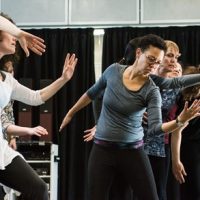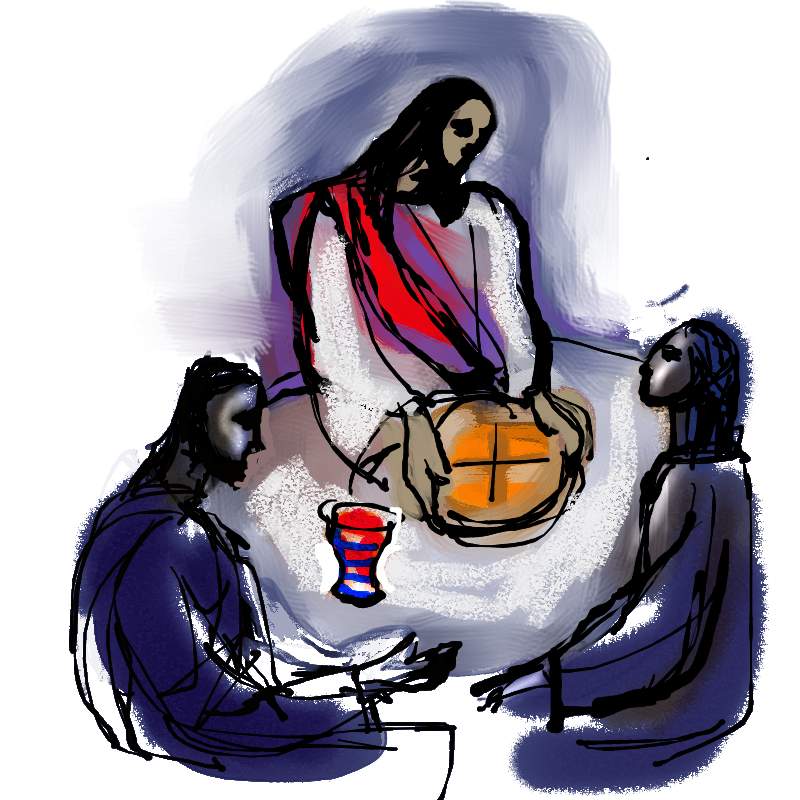Sermon given at St. Andrew’s URC Ealing, 6 Feb 2022, by Revd Sue McCoan
Isaiah 6:1-8
Luke 5:1-11
The account of Jesus calling his first disciples is in all 4 gospels, so it’s clearly important – and there are 3 different versions of what took place. Matthew and Mark give us the edited highlights – Jesus sees the fishermen, says ‘Follow me’, and off they go. John gives a different account altogether. Luke tells more or less the same story as Matthew and Mark, but tells it at much greater length – more rounded, more reasoned, and to my mind more relatable.
For a start, Luke makes it clear that Jesus, at this point of the story, has already been teaching and healing in the Galilee region. He’s been in Capernaum, where he was well received, and to his home town of Nazareth, and although his reception there was rather more mixed, he has been gaining a reputation and a following. He is beginning to attract crowds. And the crowds are reluctant to leave him alone, or to let him move on to the next town.
If you have crowds, you need a venue where they can hear. No nice indoor spaces with microphones then. Around the shore of Lake Galilee are places where the rocks form a kind of small natural amphitheatre – a crowd standing in one could easily here someone speaking from a boat. So Jesus wanders down to the Lake, and sure enough, there’s a fishing boat, not in use because the fishermen are working on their nets. ‘Mind if I borrow your boat?’ Not a problem. Simon can just as well mend his nets in the boat as on the shore. He takes the boat to where Jesus can address the crowds.
So Jesus speaks to the crowd and Simon, sitting behind him in the boat, hears every word he has to say, loud and clear. It’s good. He can see why the crowds come. Jesus finishes speaking, and Simon is ready to take him back to shore. But Jesus says, no, don’t go back just yet, go further out and lower your nets for a catch. Ah well, you can’t know everything – Jesus can talk about God, but he clearly knows nothing about fishing. If he did, he’d know that they only fish at night, and that current conditions are poor; the catch last night was pitiful. But there’s something about the way Jesus speaks to him… and it gives Simon a chance to spend more time with this interesting man… might as well give it a go. He lowers the nets, and catches more fish than he knows what to do with.
You can see what’s going on here. What’s the most important thing to a fisherman? Catching fish. How would you measure your value, personally and professionally? By the number of fish you can catch. Here is Jesus, seeing to it that Simon lands the catch of a lifetime, and in doing so he is saying to Simon, this is not just a general miracle, this is for you. God knows your needs; God knows what matters to you – and this is how much God values you, Simon. This is God’s love for you, poured out in the shape of shoals of fish.
It’s too much for Simon. He knows he is in the presence of holiness and he knows he is far from holy and it’s unbearable to have his sinfulness shown up. ‘Go away from me, Lord’. But Jesus is going nowhere. ‘Don’t be afraid, Simon. Look at this catch. God’s love is not dependent on your goodness. Look on it, and remember. Remember this for the rest of your life. Because you’re not going to be catching fish again. I have other work for you to do’.
How could Simon refuse? He, and James and John, leave everything and follow Jesus.
It’s a dramatic and powerful call. But then, Simon Peter is being called to a pivotal role in the early church. In our other bible reading, we have the call of the prophet Isaiah – very different circumstances, in that his is a vision, but similarly dramatic. And again, Isaiah was being called to a task of great significance as a major prophet of God’s people.
Most of us will probably not have such a dramatic call as these. But there are things we can learn from the call of Simon, and of Isaiah, when we think about our own calling – perhaps especially if we are trying to discern whether God is calling us to a new role.
The first thing, from both readings, is that the immediate reaction was one of fear. ‘Woe is me!’, says Isaiah, ‘I am lost’. ‘Go away from me, Lord,’ says Simon, ‘for I am a sinful man.’ The fear is both a sense of awe, of wonder at what they are seeing, and a sense of great unworthiness, that they should be in the presence of such holiness. In both cases, their fear is acknowledged and addressed – Isaiah seeing the symbolic purifying of his words, Simon hearing Jesus say, ‘Do not be afraid’.
God may call us well out of our comfort zone. Feeling fearful and unworthy is natural. It’s sometimes a clue that this is God at work.
A second thing to note is that taking on the responsibilities of the task is not immediate. Isaiah has his vision ‘in the year that King Uzziah died’, which is 740 BCE. He starts his preaching in the reign on King Ahaz, who comes to the throne in 736 BCE. So Isaiah has 4 years of preparation, of study, planning and prayer, before he has to fulfil his call. Simon Peter, called in the early weeks of Jesus’ ministry, has the best part of three years living alongside Jesus, listening, watching and learning from him, until Easter and Pentecost and he takes up the role of leading the early church.
God may call us to the unexpected, but we don’t normally have to go unprepared. If you are called to be an elder, there is guidance, there are experienced elders who will show you how it’s done. If you’re called to lead worship, there is training available, even if you are already experienced. If you want to be recognised as a preacher there is nationally approved training including placements at other churches. If you’re called to ordained ministry there is a 4-year training programme, tailored to your circumstances, to equip you with more than knowledge. And for all of us, we are encouraged to go on learning.
And a third thing from these readings, especially the gospel reading, is the way God’s call can reveal your true potential – can see things in you that you might not have seen yourself. Simon, in that boat, was getting to know Jesus; at the same time, Jesus was getting to know Simon. He saw his diligence, his knowledge, his skill in fishing; but he also saw that Simon had people skills – he could listen, he could negotiate, he could engage with honesty and an open curiosity. Jesus saw possibilities in Simon that Simon could never have dreamed of. And when we read the Acts of the Apostles, and all that Simon Peter did, we see how right Jesus was.
God may be calling you to something you’ve never considered. Of course, I’d be very glad if it was to something in the church, but it doesn’t have to be. Other callings are available. God calls some people to be brilliant grannies, or accountants, or whatever.
So this week, I invite you to listen out for God’s call on your life. And if you hear the call, may you be ready, like Simon, to follow; to say, like Isaiah, ‘Here I am. Send me’.
Let’s take a moment of silence, to ponder the way God has called us, and the way God might be calling us next. And then I’ll lead us into our prayers of concern and hope.





